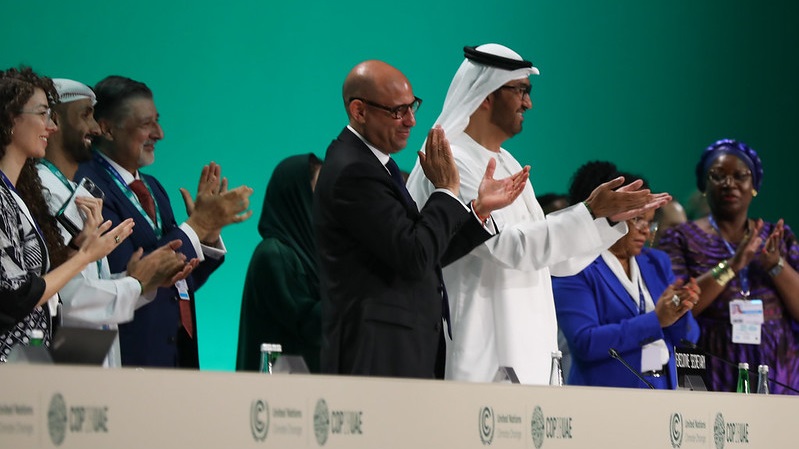In a remarkable early win for the Cop28 presidency, a loss and damage fund became official on day one. Sultan Al Jaber banged his gavel and the room rose in applause.
There were a few complaints from negotiators. But the hard-fought compromise struck in Abu Dhabi three weeks ago held, with the World Bank the interim host of the yet-to-be-named fund.
The UAE set an example by contributing $100 million of a little over $400m in pledges.
With that potentially contentious matter out of the way – and the agenda agreed – public attention will now focus squarely on the issue of fossil fuels and their phase out.
Al Jaber addressed the issue in his opening speech. Negotiators, he said, “must look for ways and ensure the inclusion of the role of fossil fuels”.
He acknowledged “strong views” on having fossil fuels in the text and added that “we collectively have the power to do something unprecedented – in fact, we have no choice but to go the very unconventional way”.
He got some applause for saying he is laser-focused on the “north star” of limiting global warming to 1.5C. He did not mention the International Energy Agency’s verdict that that means no new fossil fuel production.
He added that his presidency “made a bold choice to engage with oil and gas companies”, having difficult discussions with them and now “many” are committed to “near zero” methane emissions by 2030 and have adopted net zero by 2050 targets.
This is a reference to the Cop28 oil and gas decarbonisation accelerator, which is supposed to launch next week. Most publicly-listed oil majors already have net zero targets – but most of those do not include the emissions from burning their products.
Both as Cop28 boss and oil company CEO, Al Jaber’s focus is on producing oil and gas in a cleaner way not producing less.
Latest stories
Reality check
Before Al Jaber’s speech, Cop28 began on a personal note. Cop27 president Sameh Shoukry called the room to its feet for a moment’s silence for Saleemul Huq, Pete Betts and “all civilians who have perished during the current conflict in Gaza”. The UK, EU and Bangladeshi delegations then gave touching tributes to their former colleagues.
After reflecting on the successes of his presidency, Shoukry issued a “reality check” aimed at rich nations. “Most of what we bring forward as tangible solutions and actionable commitments is based on speculation or well wishes,” he said.
He gave examples of these “mere assumptions”: that rich countries will provide $100 billion in climate finance, that the loss and damage fund will raise billions of dollars and that international financial institutions will be reformed.
In fact, he said climate finance is decreasing in relation to developing countries’ growing needs. Weak replenishment rounds for the Green Climate Fund and Adaptation Fund “are but two examples of this worrying trend”.
He finished by criticising countries that are expanding fossil fuel production despite saying they would phase coal out. He didn’t name names but the UK’s proposed coal mine springs to mind or the US, Canada and Australia planning to increase oil and gas production.

